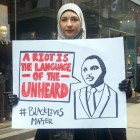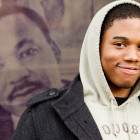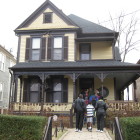
Protesters Seek NYPD Policy Change in Spirit of Dr. King
|
NEW YORK — The image and words of Dr. Martin Luther King Jr. could be seen and heard everywhere the Dream4Justice march went, from Harlem to Midtown, Monday afternoon. But as the marchers walked a slow and peaceful four miles over as many hours, King’s voice mixed with the protesters’ now familiar chants: “I have a dream” alongside “I can’t breathe” and “No justice, no peace.”
King’s memory brought organizers and protesters together but the marchers’ demands came from more recent deaths. In memory of Michael Brown, Eric Garner and others who had been killed by police, the march ended near the United Nations to bring attention to police brutality as a human rights issue. Marchers called for immediate policy change at the city and state levels in keeping with King’s philosophy. “We are non-violent but we are not peaceful,” said Tamika Mallory, an organizer and board member of The Gathering for Justice.


